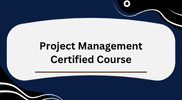
Course Description:
The Project management is the disciplined application of processes, tools, skills, and techniques to guide a unique initiative from start to finish—within a defined timeline, budget, and quality expectations. It involves planning, initiating, executing, monitoring, and closing a project to meet specific goals while coordinating resources, stakeholder expectations, and risks At its core, it balances the “triple constraint” of scope, time, and cost, ensuring deliverables are achieved effectively and efficiently . Project management also embraces various methodologies—from traditional waterfall and plan-driven models to Agile, Scrum, Kanban, Lean, and hybrid approaches—allowing teams to adapt to complexity and change
Key Features of Course Divine:
Career Opportunities After Project Management:
Essential skills you will Develop Project Management:
Tools Covered:
Syllabus:
Module 1: Introduction to Project Management Definition, objectives, and importance of project management Project life cycle and phases Role of a project manager Project stakeholders and organizational structure Key success factors in project management.
Module 2: Project Initiation & Planning Project charter and scope statement Work Breakdown Structure (WBS) Project planning tools and techniques Defining deliverables and milestones Project budgeting and cost estimation.
Module 3: Project Scheduling and Time Management Gantt charts and network diagrams Critical Path Method (CPM) Program Evaluation Review Technique (PERT)
Time estimation techniques Schedule compression strategies.
Module 4: Cost Management Cost planning and budgeting Cost baseline and control Earned Value Management (EVM) Forecasting and financial performance tracking Managing project funding and contingencies.
Module 5: Quality Management Quality planning, assurance, and control Key quality standards (ISO, Six Sigma, etc.) Continuous improvement processes Quality tools: Cause-and-effect diagrams, Pareto analysis Measuring customer satisfaction.
Module 6: Risk Management Risk identification and assessment Qualitative and quantitative risk analysis Risk response planning (mitigation, avoidance, acceptance)
Risk monitoring and control Contingency planning.
Module 7: Human Resource Management Project team roles and responsibilities
Team building and motivation Resource allocation and conflict resolution Leadership styles and emotional intelligence Stakeholder engagement.
Module 8: Communication Management Communication planning and reporting structures Stakeholder communication strategies Tools and techniques for effective communication Managing project meetings Documentation and record-keeping.
Module 9: Procurement and Contract Management Procurement planning and strategy Vendor selection and management Contract types and negotiation
Legal and ethical considerations Managing outsourcing and third-party relationships.
Module 10: Project Monitoring, Control & Closure Tracking project performance
Change management Project reviews and audits Final deliverable acceptance
Lessons learned and post-project evaluation.
Industry Projects:
Who is this program for?
How To Apply:
Mobile: 9100348679
Email: coursedivine@gmail.com

You cannot copy content of this page